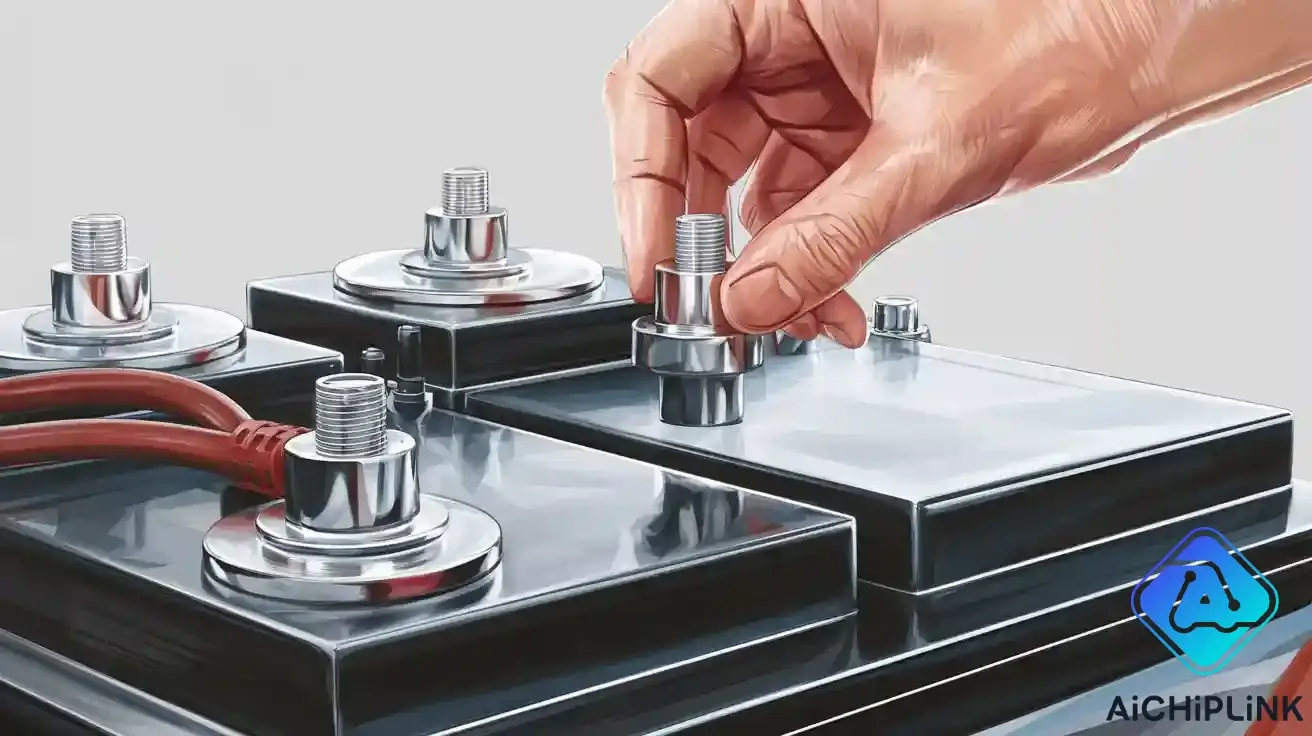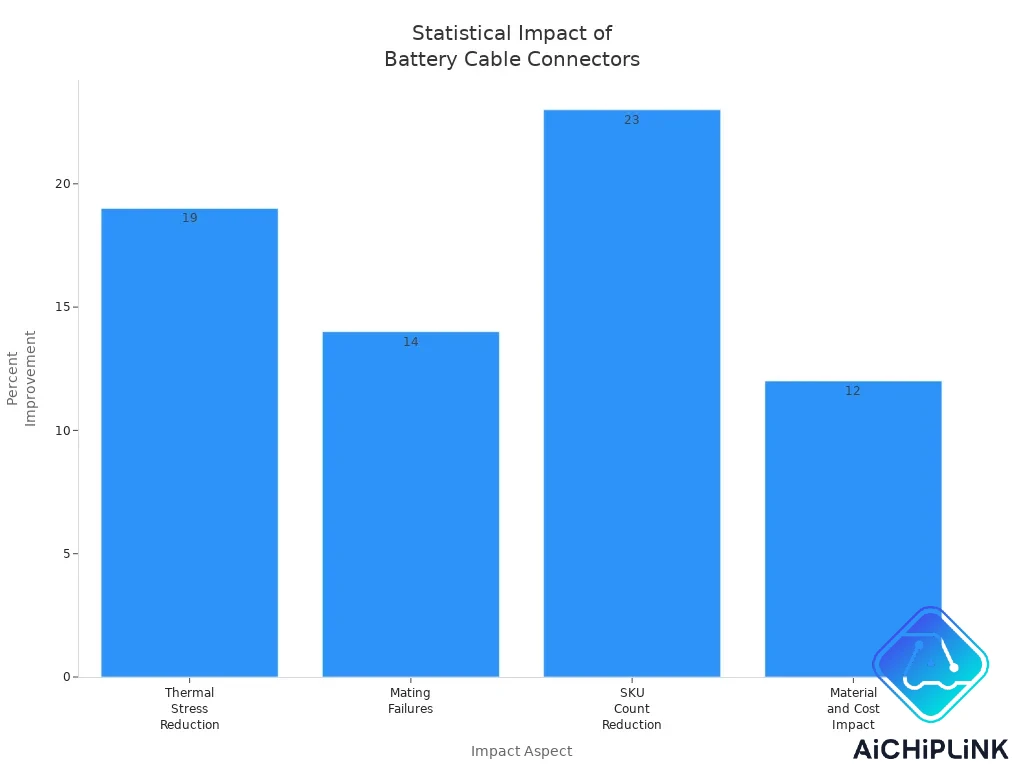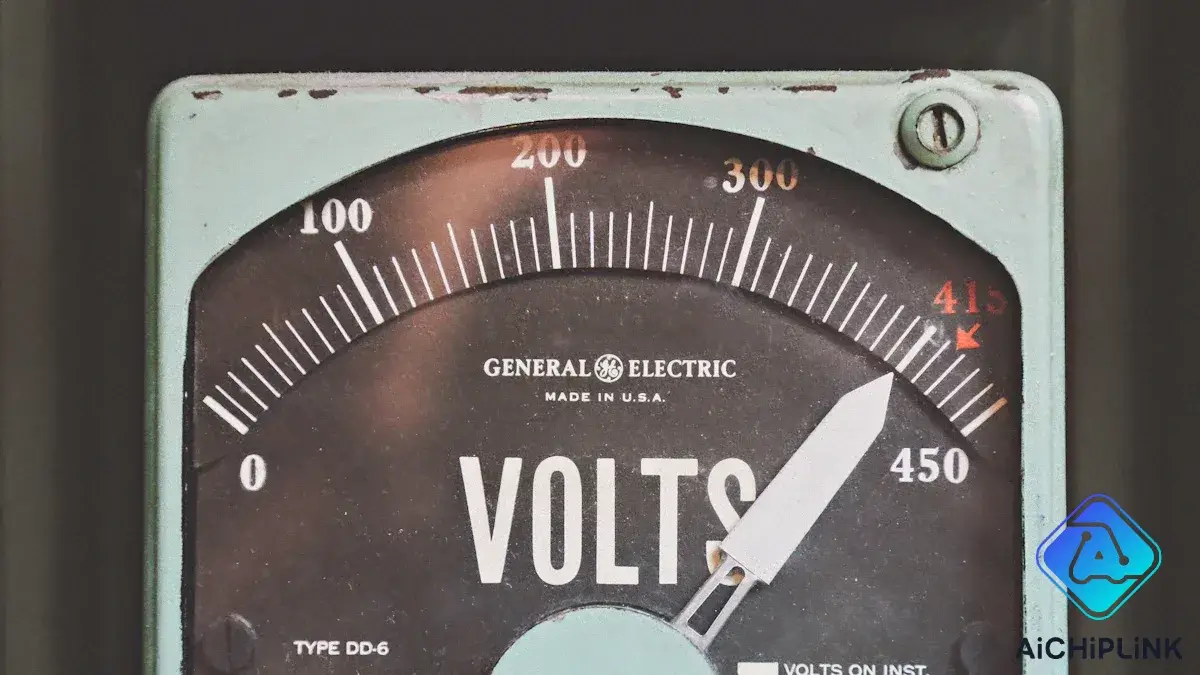
Quality battery cable connectors are very important for your car’s safety and how well it works. Good connections stop problems like dim lights, slow engine starts, and battery drain. Bad connectors can cause rust, power loss, and even electrical problems. Picking the right battery cable and connector helps keep your car safe and reliable. High-quality battery cable connectors also lower heat stress and make the electrical system stronger, as you can see below:

Key Takeaways
- Good battery cable connectors help power move smoothly. This helps your car start fast and run safely. Connectors made from copper or materials that do not rust last longer. They also help your battery work better. Bad connectors can get too hot and make sparks. This can cause fires and damage your car. Cleaning and checking connectors often stops rust. Finding problems early saves money and keeps you safe. Picking the right size and matching materials helps your car’s wires work well. It also makes your battery last longer.
Why Quality Battery Cable Connectors Matter
Reliable Power Delivery
You need battery cable connectors every time you start your car. Good connectors help your battery send power to the starter, lights, and electronics. They make sure power flows without stopping. Copper is the best material for these connectors. It carries electricity well and does not get damaged by heat or shaking. Most connectors use copper conductors to keep energy loss low. This helps power flow stay steady. If you use connectors made from copper, brass, or hybrid materials, your battery cable works better and has fewer problems.
Tip: Always make sure your battery cable connectors fit tight and match your battery cable size. A strong connection helps your battery give power smoothly and keeps your car running well.
High-quality connectors have smart designs. Some have locking parts and strong seals. These stop loose connections and signal loss. They also protect your battery cable from water, dirt, and shaking. This helps stop electrical failures. Advanced connectors can handle lots of power. They keep heat low and help your car’s system work well.
-
Copper connectors let electricity flow best.
-
Brass and stainless steel connectors do not rust in tough places.
-
Hybrid connectors mix copper and lead for better results.
Preventing Corrosion
Corrosion is a big problem for battery cable connectors. It happens when battery acid, water, and metal touch each other. This is more likely as your battery gets older or if you overcharge it. Corrosion can block electricity, hurt your battery cable, and even make your car stop working. You need connectors that fight corrosion to keep your battery cable working right.
| Material/Coating | Corrosion Resistance | Additional Notes |
|---|---|---|
| Gold | Highest corrosion resistance | Used in harsh environments; ideal for high reliability applications |
| Palladium | Excellent corrosion resistance | Harder than gold; less costly; resistant to wear |
| Tin | Lower corrosion resistance | Oxide layer forms quickly; needs higher contact force |
| Nickel | Good corrosion protection | Uniform thickness; increased resistance |
| Brass | High corrosion resistance | Common in marine and outdoor connectors |
You can stop corrosion by picking connectors with special coatings. Nickel, gold, or palladium coatings protect your battery terminals and connectors from water, road salt, and battery acid. Stainless steel connectors with nickel or chromium coatings work well in factories. Brass connectors with cadmium or tin coatings are good for outside use. Always pick connectors made to fight corrosion, especially if you drive where it is wet or salty.
-
Corrosion gets worse as batteries get older, after 3-5 years.
-
Overcharging and battery damage can make acid leak and cause corrosion.
-
Road salt and water make corrosion happen faster around battery terminals.
Electrical System Efficiency
Your car’s electrical system needs good battery cable connectors to work well. If you use bad materials, you can get voltage drops, too much heat, or even system failures. Good connectors use copper alloys, brass, and plated contacts. These handle the right amount of power and keep your battery cable safe.
| Material/Design | Benefits |
|---|---|
| Copper alloys | Make electricity flow better and last longer, lowering resistance and signal loss |
| Silver and gold coatings | Help stop rust and wear, so connectors work well for a long time |
| Advanced coatings | Keep connectors safe from damage, so they work well over time |
Connector size is important too. Bigger terminals help your battery cable handle more power, like in 48V systems. They stop sparks and make things safer. Smaller connectors save space and weight but must be designed well to work right. Always match your connector size and material to your battery cable and car needs.
-
Small connectors make cars lighter and use less space.
-
Better designs help signals stay strong and stop voltage drops.
-
Safety features like locks and rust-proof materials stop failures.
Good battery cable connectors lower the chance of electrical problems. They use strong materials, tight seals, and designs that resist shaking. Certified connectors meet rules and keep out water and dust. This keeps your battery cable and negative car battery cable safe. You will need fewer replacements and get better grounding, so your car stays reliable longer.
Safety Risks of Poor Battery Cable Connectors

Overheating and Short Circuits
Bad battery cable connectors can make your car unsafe. They often cause high resistance where they connect. This resistance makes some spots get very hot. Too much heat can melt the cable cover. Melted covers can lead to short circuits. If a connector does not carry electricity well, power cannot move right in your car.
If your battery cables feel hot or you see sparks, your connectors may be bad. Hot spots and sparks can make your car lose power or stop.
Some signs of short circuits from bad connectors are:
-
Your car will not start
-
Headlights look dim, even in daylight
-
Battery cable feels hot
-
Engine turns but does not start
-
Engine turns slowly
-
Car loses power while driving
Loose or rusty connectors can turn on warning lights. They can also cause trouble codes. These problems make it hard to find what is wrong. Repairs can cost more money. Good terminal connectors keep resistance low. They help power move smoothly and keep your car safe.
Fire and Component Damage
If connectors get too hot, they can start fires. Electricity can jump between gaps in bad connectors. This is called arcing. Arcing is a main reason for fires from connectors. Even if you do not see damage, cracks and resistance can build up. This can start a fire later.
Common damage from connector fires includes:
-
Cracks in cables or connectors
-
Battery acid leaks or melted covers
-
Higher resistance, which makes things worse
-
Damage to wires or electronic parts nearby
These problems happen when connectors do not fit well together. Damage may not show up right away. It can hurt your car’s systems or ruin them. Fires from bad connectors can spread fast. This puts you and others in danger.
Good terminal connectors keep you safe. They follow strict safety rules and pass tough tests. These connectors handle lots of power without getting too hot. They resist water and shaking. They keep your battery safe in hard conditions. They also block dust, oil, and dirt. This helps stop electrical faults and fires.
Tip: Pick connectors that follow safety rules like NEC or OSHA. These connectors stop sparks and overheating. They help keep your car safe.
Protecting Key Vehicle Systems
Your car needs strong, low-resistance connections for many parts. Bad battery cable connectors can hurt:
-
The battery (causing power loss or disconnects)
-
Wiring harnesses (making signals weak)
-
The alternator (hurting charging and power)
-
The fuse box (making electrical problems more likely)
-
The starter motor, ignition switch, and sensors (causing starting trouble)
If you use poor connectors, you risk power loss and engine stops. Lights may not work right. Fire risks go up. Your car can become unsafe and unreliable. Checking connectors often and using good ones helps keep power steady. It also protects your battery and other parts.
Using bad connectors for a long time causes:
-
Equipment breaks too soon
-
Electrical problems happen often
-
You pay more for repairs
-
Safety risks like fires or broken airbags and brakes
-
Your car does not last as long and may lose its warranty
Buying good terminal connectors gives you better safety. It lowers repair costs. Your car will run well for many years.
Choosing High-Quality Automotive Electrical Connectors
Best Materials and Design
When you pick connectors for your car, look for strong materials. Copper is the best choice for battery cable connectors. It lets electricity move easily and does not rust. Some connectors have gold or nickel on them. These coatings help stop corrosion and make the battery last longer. Plastics like nylon and polypropylene are used for the outside of connectors. These plastics make connectors light and help them last in wet places. If your battery cable is close to the engine, use connectors with metal parts that can take heat.
Industry rules like SAE and ISO say connectors must handle shaking, heat, and water. You should get connectors that follow these rules. This keeps your battery cable safe. Some connectors have wedge locks or special shapes. These features help you connect wires the right way. Shielded cables and tight seals keep water and dirt out. This makes your connections strong.
Tip: Always check if the connector can take the heat and shaking in your car’s engine area.
Matching Connector and Terminal
You need to use connectors and battery terminals that match. Use connectors made from the same material as your battery terminal. This helps stop rust and keeps your battery cable working well. For example, copper connectors work best with copper battery terminals. If you mix metals, you can get more rust and weak connections.
Here are some things to check:
-
Make sure the connector’s voltage and current ratings fit your battery cable.
-
Pick connectors that fit your wire size. Too loose or too tight can cause trouble.
-
Use insulation like PVC or Teflon to protect from heat and water.
-
Choose connectors with locks or strain relief for places that shake a lot.
A good match between connector and terminal keeps your battery cable safe. It also helps your car run better.
Identifying the Best Automotive Electrical Connectors
You can find the best connectors by looking at trusted brands and important features. Brands like TE Connectivity, Deutsch, Weatherpak, and Molex make connectors that last in tough places. These connectors keep out water, dirt, and heat. They also handle the power your car needs.
| Brand | Key Features |
|---|---|
| TE Connectivity | Handles heat, vibration, and moisture |
| Deutsch | Reliable in wet and dirty environments |
| Weatherpak | Easy to use, weatherproof |
| Molex | Fits many wire sizes, strong connections |
Look for connectors with seals, strong outsides, and good materials. These features help your battery cable and negative car battery cable last longer. Good connectors keep your battery safe and your car running well.
Maintenance for Long-Lasting Performance
Cleaning and Securing Connectors
You can help your battery cable connectors last longer by cleaning them often. First, turn off your car and let the engine cool down. Always take off the negative battery cable before the positive one. Wear gloves and goggles to stay safe. Mix one tablespoon of baking soda with one cup of water. Dip an old toothbrush in this mix and scrub away any corrosion on the battery terminals and cable ends. Rinse everything with water and dry it with a rag. When you finish cleaning, put a little petroleum jelly on the dry terminals. This helps stop acid gases and slows down corrosion. It also keeps the connection strong and helps your battery last longer. Put the cables back on and make sure they are tight.
Tip: Clean your battery cable connectors at least once a year. If you drive where it is humid or salty, check and clean them more often to stop corrosion.
Warning Signs of Failure
You should look for signs that your battery cable connectors need help or replacement. Some warning signs are:
-
Headlights or inside lights look dim
-
You lose power or the car stalls while driving
-
You see white or green powder on the cable connections
-
Cables look cracked, burned, or feel brittle
-
Battery cable connections are loose or dirty
-
Ground wire or connectors feel hot
If you see any of these problems, check your battery cable and connectors right away. Finding problems early can stop bigger issues and save money on repairs.
Extending Connector Lifespan
Doing regular maintenance helps your car’s electrical system work well. Check and clean your battery cable connectors every month if you use vented lead-acid batteries. For other batteries, check them at least once a year. Always clean off dirt and corrosion from the battery and cable ends. Use the right tools and cleaning mix, like baking soda and water. After cleaning, put the battery cables back on the right way—positive first, then negative. This keeps your system safe. Get your electrical system checked every six months to find problems early, like flickering lights or trouble starting. Taking care of your battery cable connectors helps grounding, lowers the chance of breakdowns, and makes your car last longer.
When you pick high-quality battery cable connectors, you help your car. These connectors make your battery last longer. They help your engine start every time. You spend less money on repairs. You also avoid problems like rust or fire. The table below shows how good connectors help your battery and keep you safe.
| Benefit Category | Description | Impact for You |
|---|---|---|
| Durability & Longevity | Strong materials fight heat and shaking | Fewer battery replacements |
| Corrosion Resistance | Special coatings stop battery acid damage | Longer battery life |
| Electrical Performance | Good contacts keep battery power steady | Fast engine starts |
| Safety Features | Locks and insulation protect your battery | Safer driving experience |
Look at your battery connectors often. Change them if they look bad. This keeps your battery safe and your car working well. Buy the best connectors so you do not worry.
FAQ
How often should you check your battery cable connectors?
Check your battery cable connectors two times each year. Look for rust, loose parts, or any damage. Checking often helps you find problems early. This keeps your car safe.
What materials work best for battery cable connectors?
Copper is the best choice for battery cable connectors. It lets electricity move easily and does not get too hot. Brass and stainless steel also work well in hard places. Always use the same material as your battery terminal.
Can you clean corroded battery cable connectors yourself?
Yes, you can clean corroded connectors by yourself at home. Mix baking soda and water and use a toothbrush to scrub. Rinse and dry the connectors well. Put a little petroleum jelly on them to stop more rust.
What are signs that you need to replace your battery cable connectors?
Watch for these signs:
-
Headlights look dim
-
Engine starts slowly
-
White or green powder on connectors
-
Cables look cracked or burned
If you see any of these, change your connectors soon.
Do high-quality connectors improve car performance?
Good connectors help your car start quickly and run better. They lower the chance of electrical trouble and help your battery last longer. You save money on repairs and drive more safely.

Written by Jack Elliott from AIChipLink.
AIChipLink, one of the fastest-growing global independent electronic components distributors in the world, offers millions of products from thousands of manufacturers, and many of our in-stock parts is available to ship same day.
We mainly source and distribute integrated circuit (IC) products of brands such as Broadcom, Microchip, Texas Instruments, Infineon, NXP, Analog Devices, Qualcomm, Intel, etc., which are widely used in communication & network, telecom, industrial control, new energy and automotive electronics.
Empowered by AI, Linked to the Future. Get started on AIChipLink.com and submit your RFQ online today!













